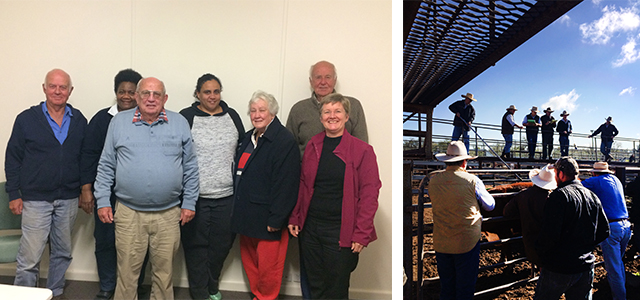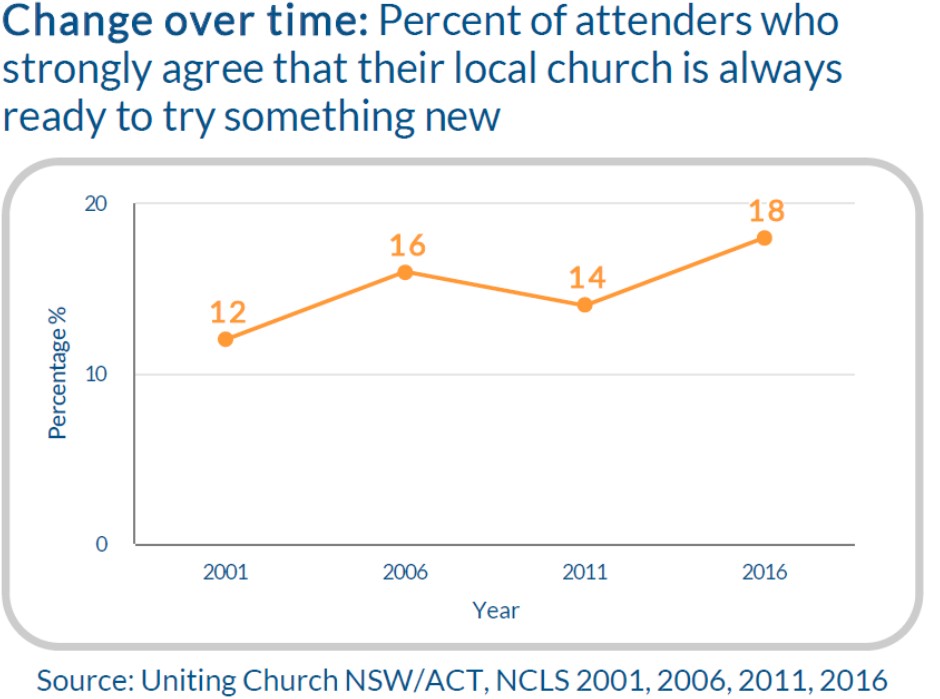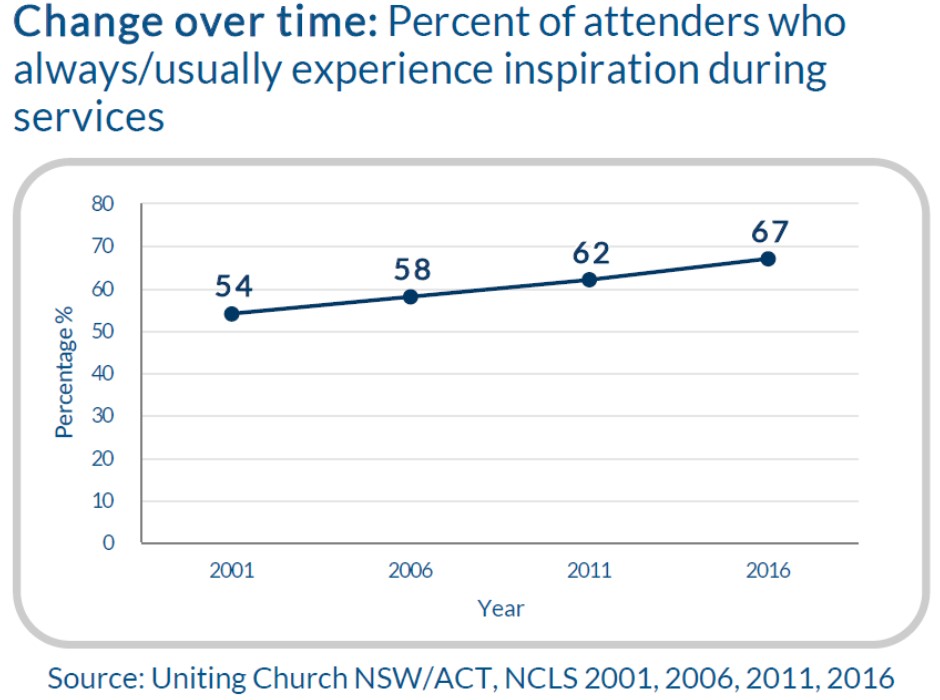The 2016 National Church Life Survey (NCLS) data results have revealed that there is a need for more active evangelism by the Uniting Church and that the local church members want their congregations to implement innovative faith initiatives.
Within the Synod of NSW/ACT, 10,183 adults and 392 children (eight to 14-years-old) from 275 local churches completed the NCLS survey with the support of UME and Uniting.
Survey results found that, currently there is a consistent figure of 22% newcomers to Uniting Churches. This includes 16 per cent who have transferred from another Uniting Church congregation or switched from a different denomination, but 5 per cent who are new to any church. This also challenges the popular rhetoric of declining church numbers.
NCLS Resource and Researches team member, Sam Sterland, states that despite this consistency if we can’t improve in our capacity to share our faith then it’s hard to imagine the number of newcomers to local churches to improve in the next five years.
This also reflects the findings of the Pathways pilot project where people have consistently reflected that their greatest challenge is to tell God’s story to their friends and neighbours in ways that are respectful and relevant.

Crucially, the 2016 NCLS also included some questions specific to the Uniting Church, including asking respondents to identify the kinds of events they feel most likely to invite friends and neighbours to. While each local result might differ, across the board our answers indicated a preference to invite newcomers to share in community meals and to musical events.
Perhaps most encouraging and challenging, at the same time, are the results related to innovation. 72% of respondents agree their local church is ready to try something new. The proportion, who strongly agreed, has increased from 12 per cent in 2001 to 18 per cent in 2016. Seven out of ten believe their local church leadership encourages innovation and creative thinking, and eight out of ten (82%) are ready to support new initiatives.
At the same time, when asked about priorities for our local churches, only 15% thought that encouraging new approaches or growing into a larger local church should be a priority and only 2% thought that starting a new church or mission venture was a priority. Rather, collectively, our priorities lie in worship services that are nurturing (36%) and spiritual growth (29%).
This seems to be saying that while we do want to support new initiatives, we are yet to make these activities a priority for our congregations. Further, we need to also bear in mind that the NCLS results reflect the thinking of the people who are already part of our congregations and that we need to also pay attention to people in our communities who have not yet discovered the grace of God for themselves. Perhaps, then, the challenge is to consider how we turn our attention to the “new things” that God is doing in our midst and in our communities and commit to joining in wherever that might take us!
Social Justice
Another set of questions were about our attitudes to social justice. In NSW/ACT, 79% of us agreed that the church should be acting on community service, justice or welfare issues, and 32% felt that we could be doing more. Responses also indicated that support with better understanding our local communities, attracting volunteers and knowing where to start and what to do could all assist in helping the church engage more effectively with our communities. This information helps the Social Justice Forum, the Church Engagement Team and Uniting Mission and Education as they continue to develop resources to support congregations in their missional engagement.
Children, young people and families
The 2016 NCLS also provided the opportunity for children to respond, which when combined with responses from parents in the main survey provides important insights.
Overwhelmingly children responded that the presence of God in their lives is important. They also see church leaders, parents and other adults in the church as important examples of what it means to follow Jesus. This is a strong reminder that when children are present within the life of the congregation, they are learning from everyone, not just those designated as leaders.
52% of respondents wanted to share their faith with children and/or grandchildren. The research also showed that retention rates for young adults are low (though consistent with previous years). Here we find some indication that supporting and equipping parents as they explore faith with children or grandparents as they explore faith with grandchildren might be one of our most important priorities.
There were more encouraging NCLS results relating to faith included that 72% of us reported much or some growth in faith related to our participation in our local church and worship. Whereas 67% of us say that, we usually or always experience inspiration during services. 76% experience a sense of God’s presence, and 71% growth in our understanding of God.
Where to from here?
It is perhaps following these types of insights that provide the most value from NCLS results, by either building upon identified strengths or stimulating growth and new behaviours in areas that are less strong.
Reinforcing the value of using the survey data in this way, NCLS Research Director Dr Ruth Powell says, “One of the exciting things about studying churches for the last 25 years is that we have learned that churches can shape their futures.”
If we are willing to allow our behaviours and practices to be challenged and potentially changed as a result of what we learn through NCLS, the process of undertaking the survey will be all the more worthwhile.
The NSW/ACT Synod is currently considering its priorities and directions for the next 5 to 10 years. The broad 2016 NCLS results not only give insight into some specific areas for immediate action in relation to these particular themes, but a great baseline from which to assess our collective (and local) progress when 2021 NCLS rolls around.
There are a range of people available to help congregations explore their NCLS results, and the implications for behaviour and practice. You can contact your local presbytery office, the UME Resourcing team or the Uniting Church Engagement team for assistance. Why not arrange a workshop where groups of congregations can come together to consider the results together? We would be happy to arrange for someone to assist in facilitating such a gathering. Contact Raymond Joso at UME at raymondj@nswact.uca.org.au to register your interest.
Did your local church miss out? Take part during 2017 for free.
In 2016, UME and Uniting provided funding to enable congregations to participate for free. While 275 congregations chose to participate in 2016 NCLS, many did not. But it is not too late if you are quick and sign up before the end of October. If your congregation did not participate in 2016 NCLS, you can still take advantage of the free offer. You will need to place your order on the 2016 NCLS website or contact the NCLS Research office before the end of November 2017. You will have until the end of the year to return your completed surveys to take advantage of the free offer.
In 2018, any local church can use a Church Life Survey at a time that suits them, with a small fee, as a way to reflect on the vitality of local church life.
Kath Merrfield














